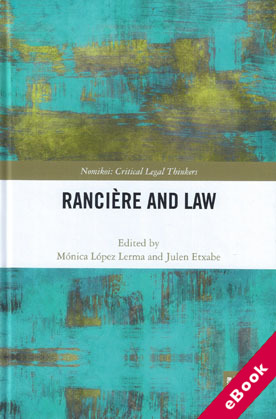
The device(s) you use to access the eBook content must be authorized with an Adobe ID before you download the product otherwise it will fail to register correctly.
For further information see https://www.wildy.com/ebook-formats
Once the order is confirmed an automated e-mail will be sent to you to allow you to download the eBook.
All eBooks are supplied firm sale and cannot be returned. If you believe there is a fault with your eBook then contact us on ebooks@wildy.com and we will help in resolving the issue. This does not affect your statutory rights.
This book is the first to approach Jacques Ranciere's work from a legal perspective. A former student of Louis Althusser, Ranciere is one of the most important contemporary French philosophers of recent decades: offering an original and path-breaking way to think politics, democracy and aesthetics.
Ranciere's work has received wide and increasing critical attention, but no study exists so far that reflects on the wider implications of Ranciere for law and for socio-legal studies. Although Ranciere does not pay much specific attention to law-and there is a strong temptation to identify law with what he terms the "police order"-much of Ranciere's historical work highlights the creative potential of law and legal language.
Indeed, he repeatedly offers powerful instances of what Robert Cover labelled jurisgenesis, of norm-generation, with important legal implications and ramifications. So, rather than excavate the Rancierean corpus for isolated statements about the law, this volume reverses such a method and asks: what would a Ranciere-inspired legal theory look like?
Bringing together specialists and scholars in different areas of law, critical theory and philosophy, this rethinking of law and socio-legal studies through Ranciere provides an original and important engagement with a range of contemporary legal topics, including constituent power, constitutional interpretation, the judicialization of politics, legal subjectivity, conflicts, human rights, the nomos of modernity, globalization, and the sensory configurations of law. It will, then, be of considerable interest to those working in these areas.